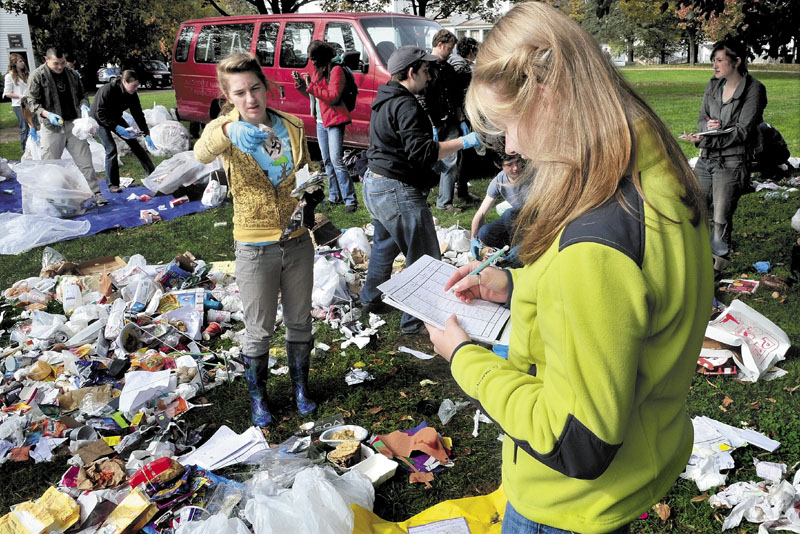FARMINGTON — Cathryn Cunningham bent down and picked up a paper bowl filled with half-eaten Stove Top stuffing, the plastic fork still sticking out of the dense brown breading.
The 20-year-old college junior from Portland started to tip-toe in her colorful rubber boots, navigating a pile of garbage strewn across the lawn at University of Maine at Farmington.
She relayed the discovery to another student standing nearby with a clipboard, who checked off a column marked organic waste.
Cunningham, wearing a blue shirt that read “Run Forest Run” above a picture of a tree running from a bulldozer, then stopped and pointed at a crushed cardboard box.
“And we’ve got the box too,” she said, identifying the stuffing’s packaging.
All around them, other teams of students pawed through papers, pizza boxes and other refuse, carefully recording each item as the smell of rotting food wafted on the afternoon breeze.
Each piece of waste, taken from garbage bins in the residence halls on campus, told a different story about how college students live. Countless lifestyle choices defined simply by what they had thrown away.
At least that’s what the students wanted to prove with the class project Wednesday for their entry-level archaeology course. The assignment introduced them to what is known in academia as “garbology,” where archeologists study garbage to draw conclusions about a culture, according to Luke Kellett, who teaches the class.
He characterized it as taking a snapshot of a moment in time, for example, recording a society’s nutritional and recycling habits through their garbage. Other archeologists and anthropologists have been digging into giant landfills to show changes in lifestyles during the last century, he said.
“Garbage can say a lot about seeing how things change over time,” Kellett said.
But, perhaps unbelievably to those without Kellett’s inquisitiveness on the matter, aspiring archeologists are not the first group at UMF to start looking for answers in garbage.
Members of the Sustainable Campus Coalition, a student group, have gotten their hands dirty for the past five years, hoping to promote recycling by sorting waste on a campus lawn for an annual event known as trash day.
Kellett’s class partnered with the student group for the first time this year, bringing a new twist to students’ previous attempts to protect the environment.
Cunningham and her partner, Mel Christensen, 19, of Brunswick, took part in the trash day event last year as members of the student group. They applied some of their newfound garbology theories to draw conclusions about today’s college lifestyle.
“There’s lots of easy-to-prepare foods, fast foods, coffee and a lot of products that have excess packaging,” Christensen said.
Christensen hates to see a lack of recycling among classmates. But looking over the 24 hours worth of trash from the dorms, she realized she can think and do more.
“I’ve been pretty consistent in my recycling habits, but it makes you think about what you buy,” she said, motioning at piles of tiny plastic wrappers.
“It’s a really good visual. It’s a really big pile of trash,” she said.
As she explained her findings, Michael Yukna, who was passing by, stopped and looked down at an entire piece of cake in a Styrofoam container.
“Who wasted that cake? I’m offended,” he said.
Yukna, 19, of Sandwich, Mass., described himself as an environmentally conscious student who stopped by just to check out the event.
“I try to recycle and tell others to do the same. It annoys me and I get frustrated when I see things get wasted,” he said.
Students lining nearby South Street held up signs about the project.
One read: “We know what you threw away last night, could you have recycled it?”
Diets laden with processed foods and the amount of food being wasted by college students stood out for Kellett. He said it shows students are extremely different from other cultures that rely on local farms or struggle to get enough to eat.
“They’re filling their stomachs with whatever they can get. There aren’t a lot of home-cooked meals, but this is college after all,” he said.
Although the data still has to be compiled and analyzed, Kellett believes early results show UMF students do seem to be avoiding certain unhealthy choices. The dig didn’t find many cigarette packs, alcohol containers or sugary soft drinks, he said.
Kelsey Ottmann, a 20-year-old organizer for the sustainability group, said there are also signs that students are improving their recycling habits, when compared to previous trash day events.
The group sorts the garbage into piles each year, separating items that could have been recycled but were thrown into the trash. Of the 23 large trash bags filled this year, only five, or 22 percent, had items that could have been recycled, according to Ottmann, of LeGrange. She called it a big improvement from last year when 40 percent of the trash could have been recycled.
“I think we’re making progress,” she said.
David Robinson — 861-9287
drobinson@centralmaine.com
Copy the Story LinkSend questions/comments to the editors.



Success. Please wait for the page to reload. If the page does not reload within 5 seconds, please refresh the page.
Enter your email and password to access comments.
Hi, to comment on stories you must . This profile is in addition to your subscription and website login.
Already have a commenting profile? .
Invalid username/password.
Please check your email to confirm and complete your registration.
Only subscribers are eligible to post comments. Please subscribe or login first for digital access. Here’s why.
Use the form below to reset your password. When you've submitted your account email, we will send an email with a reset code.